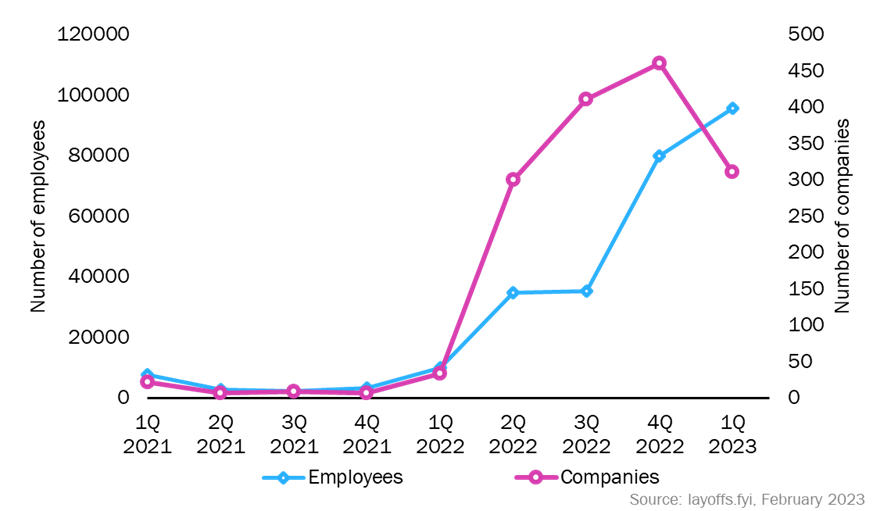Telecoms operators should rapidly pursue recently laid-off tech staff to support digital transformation projects
Telecoms companies continue to suffer from a shortage of staff with technical skills as they look to pursue digital transformation projects and move from being traditional telecoms companies to becoming ‘TechCos’. Over the past 15 years, tech companies have used their reputations for innovation and generous wages to recruit large numbers of skilled workers with specialities in software engineering, cloud, data and product management. These tech firms are now laying off workers due to slowed growth from 2Q 2022 onwards, and telecoms operators have a unique opportunity to secure workers with software skills to enable their digital transformations and address their long-term talent shortage. Telcos should commit to digitalisation and make newly acquired tech employees the centre of their future growth strategies to attract them into a telecoms environment.
Figure 1: Number of employees laid off and companies with lay offs in the tech industry, worldwide, 1Q 2021–1Q 2023

Telcos have struggled to attract workers with software skills, resulting in a skills gap that hinders full digital transformation
Telecoms companies continue to look for ways to improve customer experience, increase revenue and develop business agility. Operators such as BT, Ericsson and Vodafone are redefining themselves as TechCos – an evolution that involves digitalising and expanding offerings and processes through cloud computing. Deutsche Telekom, Telefónica, Telenor and other operators have committed to a similar process of digital transformation. These digitalisation efforts allow telcos to migrate to cloud platforms to offer more services and products to customers while increasing revenue and business agility.
Digital transformation requires employees and staff with a specific skill set, particularly in software engineering, cloud, data, product management and AI/ML. Demand for these skills continues to rise, but the availability of qualified and capable professionals has been limited as a result of the attractiveness of tech-sector companies, such as the hyperscalers. This is not a new problem for telecoms. In 2018, Jehanne Savi of Orange France estimated that it may have to reskill 50 000 employees, a third of its workforce, to avoid falling behind cloud platforms such as AWS and Microsoft Azure. Similarly, Vodafone’s Johan Wibergh acknowledged in 2022 that there is a ‘tight labour market’ in Europe for software managers, and noted that it is difficult for telcos in the USA to compete with high wages from tech companies. Telecoms operators are aware of the problem, but the skill shortage in telecoms has remained difficult to address effectively.
Tech industry redundancies present telcos with a unique opportunity to obtain much-needed staff with software skills
In the aftermath of the pandemic-driven tech-boom, tech companies are experiencing a slowdown in growth due to a combination of rising inflation and interest rates. Tech companies are also reporting less demand from a more time-strapped audience post-pandemic. In response, they are laying off large numbers of staff to protect revenue and growth. Microsoft and Amazon have both cut 5% of its workforce (10 000 and 18 000 workers, respectively), while Meta has laid off 13% of its workforce – the largest redundancies in Meta’s history. Telcos have a unique opportunity to acquire professionals with software skills to spearhead their digital transformations in 2023.
Telcos must fully commit to digital transformation and place newly acquired tech staff at the centre of their growth strategies
Telecoms operators can actively target recently laid-off tech workers to support their digital transformations by focusing on two key strategies.
- Fully committing to digital transformation from telco to TechCo and placing newly hired tech staff at the centre of their development strategies. Telcos must offer to place newly hired technical staff with software skills at the centre of an ambitious digital transformation programme. Tech companies are able to attract the best-qualified and highest-standard workers because big tech is perceived as an exciting and modern market that is innovative and offers seemingly unlimited growth. Unprecedented redundancies have tarnished this reputation. Telecoms operators can take advantage of this by ambitiously pursuing rapid and large-scale digital transformation strategies with newly-hired technical workers at the centre of these projects. Recently laid-off tech workers will be attracted to the opportunity to be valued employees with a leading role in ambitious digital transformation projects.
- Positioning telecoms as a more resilient and stable industry than tech. The second strategy that telco operators should employ to secure recently laid off tech staff is the active marketing of the stability of the telecoms market when compared to the tech market. As workers with technical and software skills are in such high demand within telecoms, recently laid-off staff can be assured of a more permanent role within the industry. Telecoms operators cannot directly compete with tech companies over wages but can offer job security and long-term career options during the economic downturn of 2023.
By employing both strategies, telcos can offer laid-off tech workers exciting development projects within which they are important and valued innovators, while simultaneously guaranteeing job security and long-term career prospects. This will make telcos an alluring choice for recently redundant tech workers, especially those who are reaching the end of their twenties and may begin to feel pushed out of the tech industry.
However, telcos must move fast to secure recently laid-off tech workers. Telecoms is not the only market to have been starved of skilled workers, with industries such as banking, healthcare and education seeking to digitalise their platforms, and tech start-ups circling to secure newly available talent that had previously eluded them. With the tech market expected to rebound in 2023, telcos must recognise the high level of competition and small window of opportunity that exists to attract and secure these necessary workers, or risk missing out on a unique opportunity to accelerate their digital transformations.
Article (PDF)
DownloadAuthor


